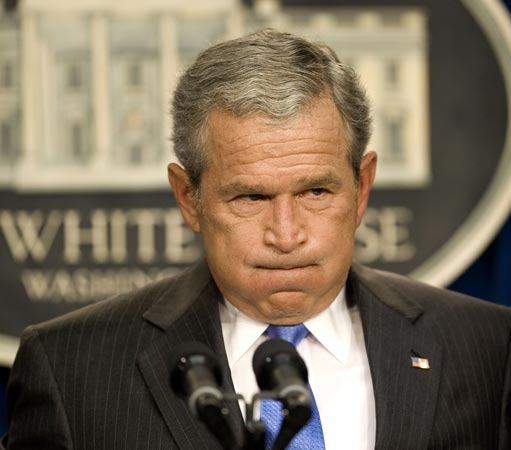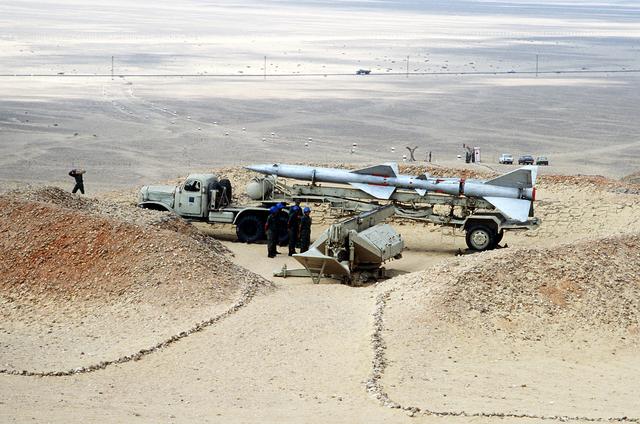Re: War in The Middle East
Bush Implies Iran, Syria Behind Assassination of Lebanese Lawmaker

September 20, 2007
President Bush condemned the assassination of an anti-Syrian Lebanese lawmaker and implied that Syria and Iran were involved in the attack.
Antoine Ghanem, a member of the Christian Phalange party, was killed along with six others when a booby-trapped car exploded in a primarily Christian neighborhood outside Beirut on Wednesday. His death comes less than a week before Lebanon's two-month presidential campaign begins on September 25. Parliament is expected to set the direction of the country, by choosing either a pro-Western or a pro-Syrian (and pro-Iranian) president. Ghanem was the eighth prominent critic of the Syrian government to be assassinated since 2005 and the fourth lawmaker from the ruling pro-Western coalition government of Prime Minister Fuad Siniora. His murder reduces the ruling majority's voting strength in parliament to 68 out of 128 seats. The opposition, which includes Hizballah, holds 59 seats.
President Bush strongly condemned the killing, saying there had been "a tragic pattern of political assassinations and attempted assassinations" intended to silence those who "courageously defend their vision of an independent and democratic Lebanon." Bush said the U.S. opposes attempts to intimidate the Lebanese, as they try to choose a president without "foreign interference." "We will continue to stand shoulder-to-shoulder with the Lebanese people, as they resist attempts by the Syrian and Iranian regimes and their allies to destabilize Lebanon and undermine its sovereignty," Bush said in a statement.
Damascus, the former power-broker in Lebanon, has never recognized the sovereignty of its tiny neighbor. Syrian troops were forced to leave the country following the assassination of former Lebanese Prime Minister Rafik Hariri in 2005, an event that triggered an anti-Syrian backlash. Senior Syrian officials have been implicated in a United Nations-sponsored investigation of the murder but Damascus has refused to cooperate. Iran is the main backer of the radical Islamic Hizballah terrorist organization, whose political wing is leading the (pro-Syrian) opposition to the Lebanese government.
Following last summer's war between Israel and Hizballah, Washington accused Iran and Syria of backing Hizballah's efforts to topple the Lebanese government. Killing off anti-Syrian politicians is seen as a means to that end. Lebanon has been described a "microcosm of all the broader conflicts in the Middle East." It has become the staging ground for conflicts that involve Syria, the Palestinians, Israel and Iran, terrorism expert Dr. Mangus Ranstorp from the Swedish National Defense College told Cybercast News Service in an earlier interview. As such, it is also become a battleground for the conflict between the U.S. and West against Iran.
Source: http://www.cnsnews.com/ViewForeignBu...20070920c.html
Bush Implies Iran, Syria Behind Assassination of Lebanese Lawmaker

September 20, 2007
President Bush condemned the assassination of an anti-Syrian Lebanese lawmaker and implied that Syria and Iran were involved in the attack.
Antoine Ghanem, a member of the Christian Phalange party, was killed along with six others when a booby-trapped car exploded in a primarily Christian neighborhood outside Beirut on Wednesday. His death comes less than a week before Lebanon's two-month presidential campaign begins on September 25. Parliament is expected to set the direction of the country, by choosing either a pro-Western or a pro-Syrian (and pro-Iranian) president. Ghanem was the eighth prominent critic of the Syrian government to be assassinated since 2005 and the fourth lawmaker from the ruling pro-Western coalition government of Prime Minister Fuad Siniora. His murder reduces the ruling majority's voting strength in parliament to 68 out of 128 seats. The opposition, which includes Hizballah, holds 59 seats.
President Bush strongly condemned the killing, saying there had been "a tragic pattern of political assassinations and attempted assassinations" intended to silence those who "courageously defend their vision of an independent and democratic Lebanon." Bush said the U.S. opposes attempts to intimidate the Lebanese, as they try to choose a president without "foreign interference." "We will continue to stand shoulder-to-shoulder with the Lebanese people, as they resist attempts by the Syrian and Iranian regimes and their allies to destabilize Lebanon and undermine its sovereignty," Bush said in a statement.
Damascus, the former power-broker in Lebanon, has never recognized the sovereignty of its tiny neighbor. Syrian troops were forced to leave the country following the assassination of former Lebanese Prime Minister Rafik Hariri in 2005, an event that triggered an anti-Syrian backlash. Senior Syrian officials have been implicated in a United Nations-sponsored investigation of the murder but Damascus has refused to cooperate. Iran is the main backer of the radical Islamic Hizballah terrorist organization, whose political wing is leading the (pro-Syrian) opposition to the Lebanese government.
Following last summer's war between Israel and Hizballah, Washington accused Iran and Syria of backing Hizballah's efforts to topple the Lebanese government. Killing off anti-Syrian politicians is seen as a means to that end. Lebanon has been described a "microcosm of all the broader conflicts in the Middle East." It has become the staging ground for conflicts that involve Syria, the Palestinians, Israel and Iran, terrorism expert Dr. Mangus Ranstorp from the Swedish National Defense College told Cybercast News Service in an earlier interview. As such, it is also become a battleground for the conflict between the U.S. and West against Iran.
Source: http://www.cnsnews.com/ViewForeignBu...20070920c.html









Comment